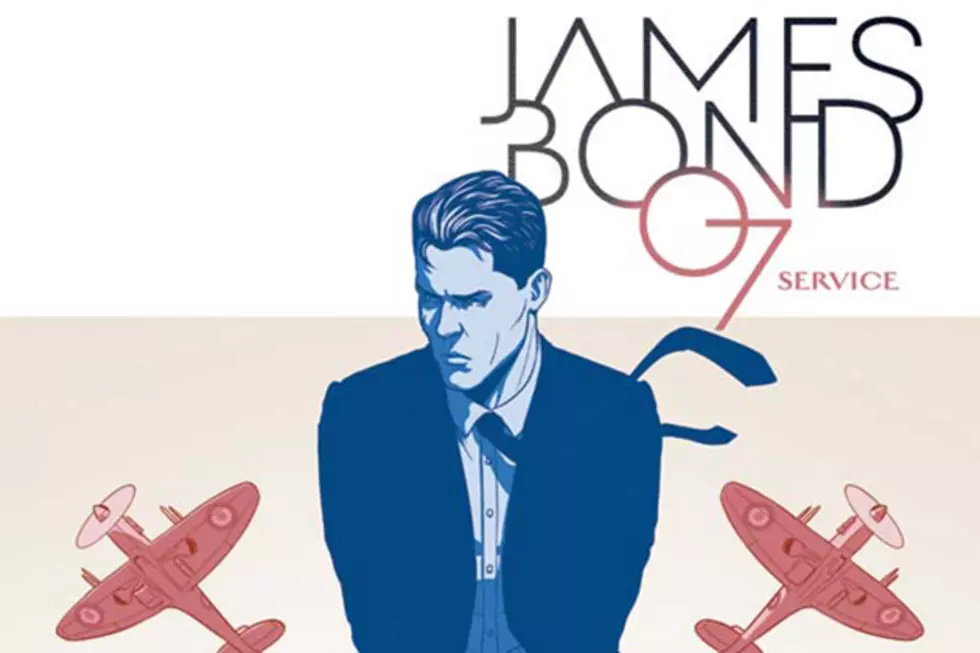
Fadeout: Kieron Gillen on the End of ‘Phonogram’

In 2006, writer Kieron Gillen and artist Jamie McKelvie debuted the first "Phonogram" volume, "Rue Brittania." Introducing the concept of "phonomancers" -- magicians using music to enter magical states -- the series quickly gained a dedicated cult following and tastemaker Warren Ellis' seal of approval. With the completion of the second volume "The Singles Club" and the trade collection (or album) set to be unveiled at Emerald City ComicCon, writer John Parker reached out to Gillen to talk about music, magic, and what the future held in store for "Phonogram."
As he quickly discovered, there may not be a future for "Phonogram." So they didn't get to talk much about music or magic.
ComicsAlliance: "The Singles Club" is seven issues, each issue telling a different character's interpretation of one night, and it's kind of a better introduction to the "Phonogram" concept than the first series. Was that your intent? Does this widening of the world lead to a volume three, or is it just a standalone episode with no further implications?
Kieron Gillen: I'll rather say that the second volume made it a lot clearer what we were talking about. The first series had this monomaniacal core to it. It was clearly about a singular individual and a singular scene. The points applied generally, but that it was so tied to this one cultural moment made it more difficult for people to extrapolate. We wanted to make sure that, by the end of the second series, everyone would get the point. They may not agree with us, but assuming they read all seven, they shouldn't have any misconception that -- for example -- we were some kind of elitist comic about how awesome our taste in records is or something.
The Rue Britannia reviews which always make me mad are normally the ones who say that we're trying so hard to be cool. If cool was the point, we'd have never selected Britpop in a million years.
So, by doing seven characters, each illustrating a different idea of what phonomancery means it allows us to distance ourselves from that single-perception thing. Here are seven ways music is magic, as told by seven people each of who have different tastes to one another. We hoped the fact that all the characters like and dislike different stuff would underline it's about the character's (or, your own) likes and dislikes rather than some kind of phonomancer canon we're trying to prove is true. It all worked towards that final issue, where Kid-with-knife lays it out for us, our own version of that Alan Moore-ian "Magic? Any c--t could do it" moment.
So the widening of perception was absolutely essential with the comic. Before it, we were a Britpop comic. Afterwards, we're not. If "Phonogram" was going to have a future, it was important to get that straight.
Of course, that's kind of rhetorical, as there - barring the mildly miraculous - there isn't going to be a series 3. It still works, I think. It wasn't just a step towards other "Phonogram stories - it was the "Phonogram" story which had to be written or else the whole endeavour would be pretty pointless. I'm just glad we managed to get it all done, y'know?
 CA: Why no third series? Is "Singles Club" the last "Phonogram" story?
CA: Why no third series? Is "Singles Club" the last "Phonogram" story?
CA: Don't you think you'll be making that up with the trade? Lots of good comics aren't selling well, why do you think your lack of financial success precludes a third volume down the road? Why not explore other publishers or imprints like Vertigo or Marvel Icon?
Frankly, Jamie is just shy of thirty and one of the most talented illustrators of his generation. Even I'm not a big a bastard enough to want him to spend another year in "Phonogram"'s brand of hell. He deserves a paycheck.
Other options? Vertigo would never publish "Phonogram." The stuff we do with real bands is far too grey-area for Warner [Bros]. I'm not Bendis or Brubaker, so Icon would never fly. Most companies you suspect would be interested aren't, from what I understand - though I haven't actually pursued it with any seriousness.
Best plan I have is just writing series 3 and then writing into my will that assuming I die young and Jamie's still around, lob him whatever's in my bank account to draw it. Which is assuming he'd even be willing to do it then. It's not that we're bitter about it -- well, not just because we're bitter about it -- but that it's been emotionally exhausting. We've been doing "Phonogram" for over 4 years, not including the years before the first series came out. Imagine if we could have just done the comic and not had to deal with any of the shit we've had to. We'd have been up to issue 44 now. Instead, we have 13 issues.
I feel frustrated. Enormously lucky, sure, but frustrated. We've done this wonderful thing we're crazy-proud about. But if the whole economic system was just a couple of degrees to the left, everything would have been different. I mean, just to give you an idea about narrow the margins are between what we are and what we could be, if we were selling 6K instead of 4K, we could have done those 44 issues. The difference between breaking even and actually being able to do it in comics is insane. It's like being kept under ice, clawing. I feel like a bonsai plant.

We've changed the way people dressed. We've made people walk around clubs, deciding to cloak themsleves in my metaphor and found it true. We've made people decide to do comics. We've introduced a whole load of people to a whole bunch of shitty bands. We've -- and these are ones I really treasure -- made some people get what's going on inside music obsessive's heads, when they've previously never really got pop. We've even got a few people laid.
We totally got those people. We did the book because no-one else would do it, and we thought people would love it. And if people don't continue to nag at me in 10 years time about it, I'd actually be somewhat disappointed. We became our own Kenickie, and that scares me, because that was always the plan and getting what you wanted is petrifying.
The price of doing "Phonogram" is the price of doing "Phonogram." We were always willing to pay it.
CA: Jamie McKelvie is both ridiculously talented and horrifically underrated, and it's obvious looking at the finished pages that the two of you have a unique collaboration. Do you have plans -- or at least hopes -- to work with him again, even if it's not on "Phonogram"?
Bar that... well, I'd be sad if I never work with Jamie again. On the other hand, we've been living in each other's pockets for the best part of a decade. I suspect we could do with a break from each other, at least for a year or so. If we don't do that, I suspect we'd end up in a pit, stripped naked, wielding blades, covered in blood and screaming. As much as I'd enjoy the passing thrill of pushing a nice thick knife through Jamie's head, I don't think that would be good for anyone in the long term.
CA: Don't pretend to know the intricacies of the knife industry, sir. If "Phonogram" is truly gone, what's the perfect song to send it off?
More From ComicsAlliance

![Bond After Brexit: Kieron Gillen Declassifies ‘James Bond: Service’ [Interview]](http://townsquare.media/site/622/files/2017/03/Service_McKelvie-feat.jpeg?w=980&q=75)



![The Hero We’ve Been Waiting For: ‘America’ #1 By Gabby Rivera And Joe Quinones [Preview]](http://townsquare.media/site/622/files/2017/02/America_1_Featured.jpg?w=980&q=75)
![Sweet Gigs: Best Band Posters by Comic Artists Ever [Music Week]](http://townsquare.media/site/622/files/2017/01/posters.jpg?w=980&q=75)
![You, Me, Dancing: The Impact Of Gillen, McKelvie And Wilson’s ‘Phonogram’ [Music Week]](http://townsquare.media/site/622/files/2017/01/Phonogram-Featured.png?w=980&q=75)

